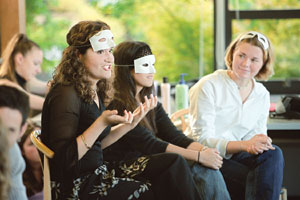 |


|
Autumn 2002 | Volume 25, Number 4 | |||
| A Day of Common Learning ON ITS FIRST-EVER “Day of Common Learning,” Seattle Pacific University explored the topic of integrity as an academic community. Regular classes were cancelled for the October 17 event sponsored by the new Center for Scholarship and Faculty Development. In the morning, students, faculty, staff and members of the public filled Brougham Pavilion to hear keynote speaker Stephen Carter, author of the best-selling book Integrity. In the afternoon, 16 seminars were held across campus, exploring the topics of integrity and character in various arenas,including health care, business, technology, art, sport and more. What follows are examples of the afternoon seminars, summarized by Response writers and other members of the SPU community:
Where’s Your Mask? Facing issues of vulnerability and fear head-on, a student dramatic presentation of “Where’s Your Mask?” encouraged audience members to acknowledge, accept and celebrate differences in the Seattle Pacific community. The play, written and performed by the student club MOSAIC, depicted a group of SPU students from different walks of life learning to remove their “masks” and be authentic with themselves and each other. A discussion between cast members and the audience focused on why vulnerability is critical to personal integrity. — Sarah Jio, Staff Writer E.R. Ethics: Integrity in the Emergency Room This seminar forced audience members to think through the ethical challenges that come during the intense pressure when people’s lives are at stake. Based on issues discussed in the freshman University Seminar titled “Life From the E.R.,” the session focused on real-life scenarios. What if a person dying of a knife wound refuses a blood transfusion based on religious convictions? Should a comatose elderly woman be kept alive, though her quality of life suffers? A panel of premed students posed the questions and provoked a lively discussion of the role faith might play in each case. — Clint Kelly, Staff Writer Sex, Lies and Video Games: Integrity and Student Life Some of SPU’s student leaders, including ASSP President Jason Van Winkle, guided the discussion of integrity in student life, including relationships, community, academics, identity and leadership. One panelist brought up the hypocrisy of wearing a spiritual persona — based on the expectations of a Christian subculture such as at SPU — and the need to be authentic before ourselves, God and others. Another panelist questioned students’ propensity to sacrifice integrity on the altar of success and good grades. Students concluded that if we are honest with ourselves and admit our brokenness, we can get beyond pretense and into true community. — Joanna Rice, Senior English Major Integrity in The Emperor of Ocean Park A panel with two professors, a student and a staff member led a discussion on Stephen Carter’s best-selling novel The Emperor of Ocean Park. Did it, the panel asked, reflect his views on integrity? Some saw a strength and consistency in the book’s characters that revealed integrity. Others saw only an emerging integrity, especially in the main character, Talcott Garland. One panelist argued that the novel’s genre — which straddles mystery, melodrama and adventure — didn’t meet Carter’s definition of integrity as “wholeness.” Participants agreed, however, that Carter’s fiction writing style is a pleasure worth experiencing. — Linda Wagner, Director of the Center for Learning Integrity and Journalism — Mutually Exclusive? Falcon reporters and their journalism instructor debated, among other things, what Carter calls “emotional pornography,’’ or journalists’ frequent focus on emotions by asking, “How did you feel?” What, asked the panel, is the correct balance between humanizing the news and acting humanely to people being interviewed? Student reporters agreed that keeping their word and telling the truth are important to integrity in journalism, although it isn’t always easy — or clear-cut. “Facts are not as clearly defined as Carter makes it appear,” said one panelist. — Tracy Cooper, News and Media Relations Manager What Does Integrity Have to Do With Art? A panel made up of three professors and a student agreed that being real or “authentic,” as Stephen Carter says, is key to integrity as a musician, visual artist, graphic designer, actor or writer. Panelists also echoed Carter in saying that a clear sense of right and wrong is the first step in artistic integrity. Acting on that moral vision in the art you create is the second step, and stating your reasons is the third. — Merry Jensen, Performing Groups Coordinator
|
From the President The purpose of the Campaign for Seattle Pacific is bigger than ourselves. "We are really investing in a venture of change and hope," says President Philip Eaton. Meet the Alumni Board President
Reconciliation in South
Africa Friendly Competition My Response
|
